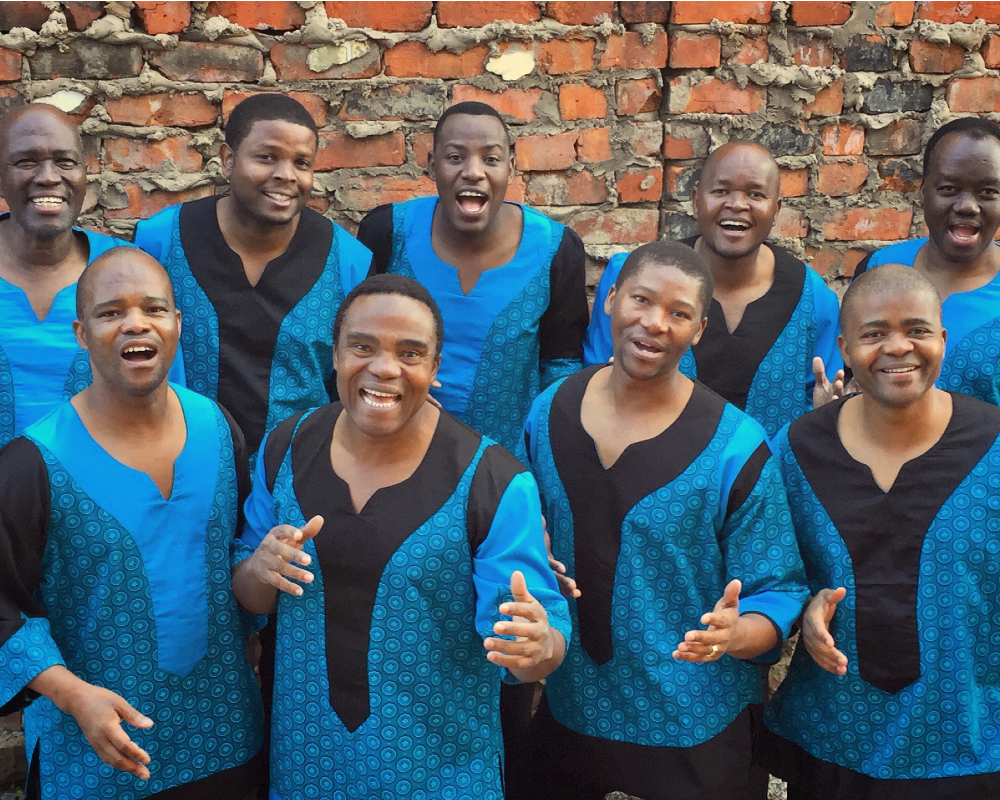
Ladysmith Black Mambazo
Thursday, March 21, 2024 AT 8PM
Global View Series Sponsored by
Worah Family Foundation
This performance will include a 15-minute intermission.
Ladysmith Black Mambazo
Thulani Shabalala
Sibongiseni Shabalala
Thamsanqa Shabalala
Msizi Shabalala
Albert Mazibuko
Abednego Mazibuko
Mfanafuthi Dlamini
Pius Shezi
Sabelo Mthembu
Over Sixty Years Later The Impossible Dream Continues
Let us tell you a story. An impossible to believe, yet, true story. Once upon a time there was a teenage boy working on his family farm in apartheid South Africa. The year was 1960. This boy loved to sing, in fact he loved to sing so much that he allowed himself an impossible dream. In his dream he would create a group of singers, from his family members, to sing traditional South African songs. His group would perform all over South Africa and they would become the greatest music group his country would ever know. How could such a dream come to a young farm boy in a country rife with hardship, violence and trouble? Well, Joseph Shabalala was this young farm boy and his dream would become Ladysmith Black Mambazo.
The year 2023 marked the 63rd anniversary of Joseph Shabalala forming Ladysmith Black Mambazo. His group would not only conquer all of South Africa, but would become a worldwide phenomenon, winning more Grammy Awards (Five), and receiving more Grammy Award nominations (Nineteen), than any World Music group in the history of recorded music.
During the dark years of South African Apartheid, Ladysmith Black Mambazo followed a path of peaceful protest through songs of hope and love. When Nelson Mandela was released from prison, in 1990, he said that Ladysmith Black Mambazo’s music was a powerful message of peace that he listened to while in jail. When Mandela was awarded the Nobel Peace Prize, in 1993, he asked the group to join him at the ceremony. It was Mandela who called Ladysmith Black Mambazo “South Africa’s Cultural Ambassadors to the World.”
The group sings a traditional music style called isicathamiya (Is-Cot-A-Mee-Ya), which developed in the mines of South Africa. It was there that black workers were taken to work far away from their homes and families. Poorly housed and paid, the mine workers would entertain themselves, after a six-day work week, by singing songs into the wee hours on Saturday night and Sunday. When the miners returned to their homes, this musical tradition returned with them.
In the mid-1980s, American singer/songwriter Paul Simon famously visited South Africa and incorporated the group's rich harmonies into his renowned Graceland album – a landmark recording considered seminal in introducing World Music to mainstream audiences. This brought the group to the attention of music lovers all over the world, the beginning of a global musical career that shows no sign of ending.
After leading his group for over fifty years and approaching his seventy-fifth birthday, Joseph Shabalala retired in 2014, handing the leadership to his three sons, Thulani, Sibongiseni and Thamsanqa Shabalala. Having joined their father’s group in 1993, their many years of training had prepared them in ways no others could be trained. Now, carrying their father’s dream into the future, the Shabalala Family continues the group’s success for the world to hear.
Ladysmith Black Mambazo is Thulani Shabalala, Sibongiseni Shabalala, Thamsanqa Shabalala, Msizi Shabalala, Albert Mazibuko, Abednego Mazibuko, Mfanafuthi Dlamini, Pius Shezi, and Sabelo Mthembu.